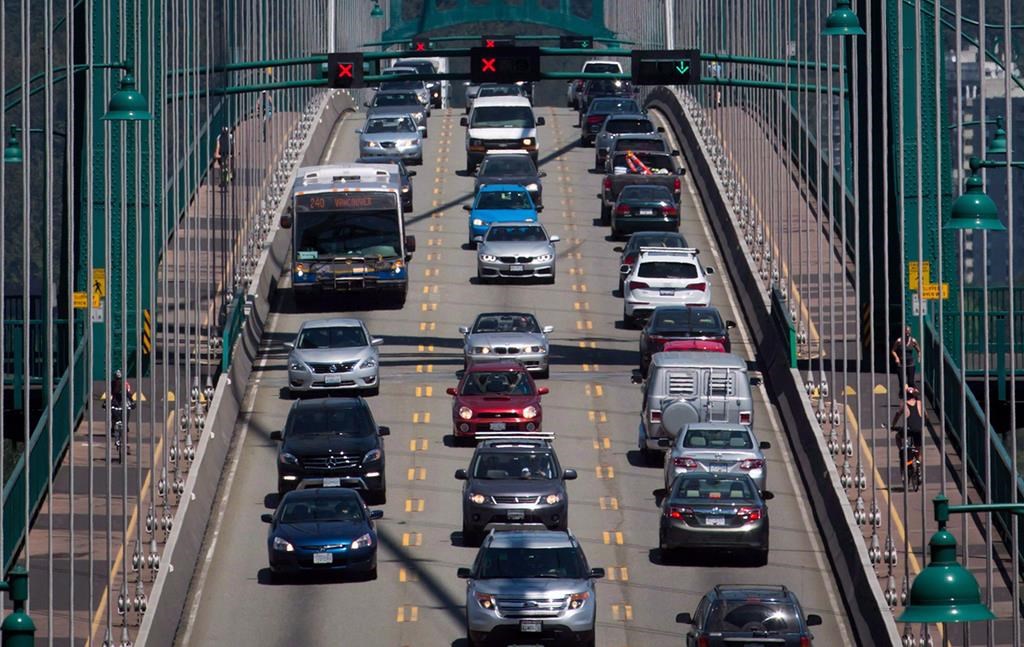An advocacy group is turning up the heat in the carbon tax debate, touting a new poll it says shows British Columbians are tired of the initiative.

The poll, conducted by Innovative Research Group and commissioned by the Canadian Taxpayers Federation, found 49 per cent of respondents opposed B.C.’s carbon tax, compared to 24 per cent in support.
Opposition was strongest in B.C.s Interior/North (58 per cent), among BC Conservative (72 per cent) and BC United (61 per cent) voters, among those earning $40,000 to $150,000 (51 per cent) and more than $150,000 (56 per cent), and among people aged 35 to 54 (50 per cent) and those aged 55 and over (59 per cent).

Opposition was lowest among those on Vancouver Island (44 per cent), NDP (33 per cent) and Green (34 per cent) voters, those earning under $40,000 a year (44 per cent) and people aged 18-34 (34 per cent).
“About twice as many people oppose the carbon tax as support it,” said Carson Binda, B.C. director for the Canadian Taxpayers Federation.
Binda said the poll shows net support for the carbon tax has dropped 28 per cent in the last six months, as British Columbians grapple with “outrageous home heating bills that are drastically inflated by the carbon tax.”
About two-thirds of respondents, with majorities in all categories and across parties, also said they supported a cut in gasoline taxes.

Get breaking National news
“The carbon tax will not solve climate change,” Binda argued, adding it should be a “no-brainier” for the BC NDP to cut both the carbon tax and fuel taxes.
Jens Wieting, science adviser for the Sierra Club of B.C., raised concerns about how the poll’s questions were framed — noting they didn’t factor in the costs of not addressing the climate crisis.

The 2021 floods and landslides in B.C. cost more than $17 billion in infrastructure repairs alone, he said, while the cost of fighting the 2023 wildfires neared $1 billion.
“It’s clear that we are in a climate crisis, and the cost of the climate crisis is escalating, and I really wish that all concerns about our tax dollars also looked at cost of the climate crisis,” he said.
“We have now climate disasters every year … Clearly we need a price on pollution, and it has to increase.”
The poll also failed to acknowledge that millions of British Columbians receive hundreds of dollars in carbon tax rebates every year, he said.
Wieting said there is no question the province needs to find ways to address cost of living problems, but said it should look at solutions like cutting fossil fuel subsidies that would free up money while addressing climate change.
“We are at a point where we are not making enough progress to meet our climate targets,” he said.
“If we were to lose the carbon tax, we would fall even further behind. So instead of taking stronger climate action, we would be left with weaker climate action, and that would be a terrible idea at this point in time.”

Binda, meanwhile, suggested the poll shows B.C.’s NDP facing growing political pressure on the carbon tax file.
“We are seeing the national conversation around carbon taxes changing dramatically over the past several months,” he said.
“We’ve seen David Eby’s counterpart in Manitoba, Wab Kinew, who is a New Democratic premier moving to axe gas taxes and call for various exemptions on carbon taxes; we’ve seen the federal NDP vote alongside the Conservatives on a motion to remove the carbon tax from home heating.”
Under British Columbia’s 2030 climate targets, the province has committed to slashing greenhouse gas emissions in the transportation sector by between 27 and 32 per cent, in industry by 38-43 per cent, in the oil and gas sector by between 33 and 38 per cent and in buildings and communities by between 59 and 64 per cent below 2007 levels.
As of 2020, emissions in the transportation sector were up 11.7 per cent, while the oil and gas sector had fallen by 7.2 per cent, other industry had fallen by 8.4 per cent and buildings and communities had fallen by 9.9 per cent.
The poll was conducted between Oct. 26 and Oct. 30 via Innovative Research Groups’ online national research panel with additional respondents form online sample provider Lucid. It included 1,125 adult British Columbians, weighted with Statistics Canada census data. No margin of error is available because the online survey pool was not a random probability-based sample.
Sign up to receive newsletters and breaking news email alerts.
- Russia’s economy is struggling from sanctions, western officials say. Here’s why
- Crown must settle with First Nations for breaching Robinson treaties: Supreme Court
- Jasper wildfire, a rate cut, Earth’s hottest days. This week’s big stories
- Trump shooting is latest in ‘very long’ global wave of political violence




Comments